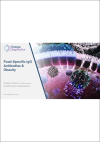Increased intestinal permeability and its impact upon health

In a healthy digestive system, the intestinal mucosa enables vital nutrients to be absorbed, whilst at the same time, working as the body’s primary barrier against the migration of pathogenic substances from the human gut into the bloodstream. An excessive increase in intestinal mucosa permeability (leaky gut), can therefore result in the increased absorption of intestinally derived endotoxin, bacteria, protein antigens and inflammatory mediators into circulation.
Toxins that escape the gut lumen, stimulate the production of cytokines and pro-inflammatory mediators, leading to a localised inflammatory response and a subsequent increase in intestinal inflammation. The resultant mucosal damage can lead to increased intestinal permeability, thus stimulating the further release of pro-inflammatory mediators, as well as enabling the translocation of gut bacteria. The “leakage” of toxins and inflammatory cytokines from the intestinal lumen into circulation, has been associated with numerous chronic inflammatory, functional and autoimmune disorders, including Irritable Bowel Syndrome , Chronic heart failure, acute pancreatitis, coeliac disease and type 1 diabetes (Zhou et al, 2009; Sandek et al, 2007; Sonika et al, 2017; Heyman et al, 2017; Hollon et al, 2015; Visser et al, 2009). In fact, at its most severe, catastrophic gut mucosal barrier failure has been found to be a significant cause of multiple organ failure, and with a mortality rate of approximately 70%, it is the primary cause of death in surgical intensive care units.
Potential causes of increased intestinal permeability and gut barrier dysfunction
Generally, it has been accepted that most incidences of intestinal barrier dysfunction, involve mucosal inflammation and oxidative stress as the central pathophysiological driving mechanisms. Research has in fact identified numerous risk factors that potentially trigger intestinal permeability defects. These include (but are not limited to) trauma, shock, surgery, burns, sepsis, pancreatitis, intestinal inflammation, mucosal oxidative stress, stress, non-steroidal inflammatory drugs (NSAIDs), alcohol consumption, cow’s milk intolerance, small intestine bacterial overgrowth (SIBO), pancreatic insufficiency, intestinal infections and obstructive jaundice. Considering these risk factors, addressing intestinal barrier dysfunction effectively, requires not only appropriate sound nutritional interventions (and potentially supplement support), but may also require some key relevant lifestyle changes to be implanted.
Nutritional & lifestyle interventions to address increased intestinal permeability
Increased gut permeability, as previously mentioned, not only enables pathogenic substances, but also partially digested food proteins, to enter the circulation, which can trigger the production of food-specific IgG antibodies, potentially leading to IgG-mediated food intolerance. Due to this mechanism, an increased number of foods to which an individual has an elevated IgG antibody concentration, might therefore suggest a greater level of increased intestinal permeability. It may therefore be prudent in such cases, to implement an effective gut healing protocol, concurrently with an appropriate IgG based elimination diet, to achieve long term improvement of not only IgG mediated food intolerance symptoms, but also increased general wellbeing with a reduction in low grade inflammation (De Punder and Pruimboom , 2015; Fukui, 2016; Karakula-Juchnowicz et al, 2018).
Research suggests that certain nutritional interventions (highlighted below) may promote normal intestinal permeability and generally support mucosal health. Indeed, numerous studies have shown an association between improved intestinal integrity, following the supplementation of specific mucosal nutrients, antioxidants, probiotics, enzymes and dietary fibre and therefore, these may be worth investigating more fully when addressing dysfunctional intestinal integrity (Burton and Anderson, 1983; Dial et al, 2008; Finamore et al, 2008; Otamiri and Tagesson, 1989; Shaik et al, 2006; Suzuki and Hara, 2009; Van der Hulst et al, 1993; White et al, 2005; Willemsen et al, 2008).
Mucosal nutrients
As a vital energy source for intestinal mucosa cells, L-glutamine has been identified as conditionally essential for proper mucosal structure and function. This nutrient also appears to be needed for normal Secretory IgA production within the intestines, which is key to maintaining optimal intestinal mucosa immune barrier function. L-glutamine has in fact demonstrated the ability to not only assist with the maintenance of intestinal barrier function against bacteria, but also in sustaining overall gut mass and therefore, could be essential for addressing increased intestinal permeability, especially in critically ill individuals (Kudsk et al, 2000; Van der Hulst et al, 1993; White et al, 2005).
N-acetyl-D-glucosamine (NAG) is abundant in intestinal mucus, secretory IgA, and other immunoglobulins. Intestinal mucus provides a mechanical and immunological barrier against toxins, bacteria and antigens within the gut lumen. In addition, research has also demonstrated that NAG impedes the adherence of Candida albicans to the gastrointestinal mucosa, in addition to promoting the growth of beneficial Bifidobacteria, which can further help to improve gut integrity (Burton and Anderson, 1983; Ghannoum et al, 1991;.
Phosphatidylcholine (PC) is a component of human bile and an integral constituent of the hydrophobic mucus gel that provides protection for the GI mucosa. With lipopolysaccharide (LPS) exposure having the ability to cause injury to both gastrointestinal and non-gastrointestinal tissues, a Dial et al, (2008) study importantly demonstrated that pathological increases in intestinal permeability were considerably inhibited following the oral administration of PC prior to LPS and other intestinal endotoxin exposure.
The polyunsaturated fatty acids gamma-linolenic acid (GLA), eicosapentaenoic acid (EPA) and docosahexaenoic acid (DHA) have been shown to be integrated into the phospholipid membrane of human mucosal epithelial cells, as well as reducing mucosal permeability dysfunction caused by pro-inflammatory cytokines. Therefore, the introduction of these PUFAs into an individual’s dietary and/or supplement programme, can also positively impact upon gut permeability (Willemsen et al, 2008).
Antioxidants
Quercetin is a naturally occurring flavonoid that has demonstrated the ability to improve intestinal barrier function. With mast cells performing a significant role in relation to intestinal mucosal inflammation and the subsequent pathogenesis of increased intestinal permeability, this antioxidant helps to limit intestinal inflammation by impeding histamine release, as well as limiting the production of pro-inflammatory cytokines such as TNF-alpha and IL-6 from human mast cells (Pearce et al, 1984; Shaik et al, 2006; Suzuki and Hara, 2009).
Oral supplementation with Gingko Biloba Extract has been shown to decrease colonic mucosa damage, as well as pro-inflammatory cytokine production and so, this may also be a potential intervention that may positively impact intestinal permeability and healthy gut function (Otamiri and Tagesson, 1989).
The antioxidant N-acetyl-L-cysteine (NAC) is a precursor for glutathione synthesis, both of which reduce oxidative damage of the intestinal mucosa, and in fact, the use of NAC has demonstrated a capacity to inhibit increased intestinal permeability following intestinal ischemia (Sun et al, 2002).
Research has indicated that zinc deficiency may trigger some disruption to proper intestinal mucosal barrier function, as well as increasing the secretion of inflammatory mediators within human intestinal epithelial cells. Therefore, as dietary zinc appears to play a vital role in the maintenance of normal intestinal permeability and the control of inflammation, this may be another gut healing intervention worth considering for appropriate individuals (Finamore et al, 2008). Care should of course be taken if supplementing with this particular mineral, as it competes with copper for absorption and can therefore, potentially lead to an imbalance between these two essential minerals.
Protecting intestinal mucosal cells from oxidative and free-radical damage is one of the crucial roles that both vitamins C and E play within the human body; and indeed, treatment with these particular vitamins has also been shown to reduce bacterial translocation from the intestinal lumen. A reduction in inflammation within the colonic mucosa of ulcerative colitis patients, has been demonstrated with the oral supplementation with vitamin E and research has also found that levels of vitamin C within mucosal tissues of patients with Irritable Bowel Disease (IBD) can be significantly decreased, compared to non-IBD controls. With the pathophysiological mechanisms of mucosal oxidative stress and intestinal inflammation found in both IBD and intestinal permeability, it appears rational to hypothesise that vitamins C and E may also support normal intestinal permeability function (Buffinton and Doe, 1995; Schimpl et al, 1997).
Probiotics
Numerous research papers have identified the potential benefits that supplementation with good quality probiotics may have in relation to improving intestinal permeability dysfunction and associated disorders, including IBD and IBS and atopic dermatitis (Fujimori et al, 2009; Ramakrishna 2009; Rosenfeldt et al, 2004; Salminen et al, 1996; Zeng et al, 2008). However, for a probiotic supplement to be effective, it must crucially have the ability to survive the acidity of the stomach, enabling it to successfully colonize the intestinal tract.
Enzymes
Impaired digestion as a result of digestive enzyme deficiency and imbalances in the pH of the GI tract, can lead to increased intestinal permeability and negatively impact the absorption of nutrients, bacterial overgrowth and food intolerance. It has been identified that particular acid-stable fungal enzyme preparations actually have the ability to be active in both acid and alkaline conditions and therefore, as a result of this extensive pH range of activity, they are able to begin digesting food in the stomach, before continuing to do so in the intestinal tract (Roberts, 1989; Schneider et al, 1985).
Dietary Fibre
Dietary fibre has also demonstrated an ability to assist with the maintenance of normal intestinal mucosa barrier function. The growth of beneficial Bifidobacteria is in fact promoted by the fermentation of soluble fibre by colonic microflora; a process which also provides the main source of intestinal short-chain fatty acids (including butyric acid) to the gut. This particular fatty acid has been shown to supply the intestinal epithelial cells with a vital energy source, impede inflammation, decrease oxidative stress and maintain proper barrier function of the colonic mucosa (Deng et al, 1998; Hammer et al, 2008; Mosenthal et al, 2002).








